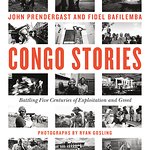Actor and activist Ryan Gosling recently traveled with the ENOUGH Project to eastern Congo to witness first-hand the effects of war there.
From the scenes he captured, Ryan created a video for the ENOUGH Project’s “Raise Hope for Congo” campaign working to create a permanent solution to Congo’s war. He also wrote a op-ed with ENOUGH Project’s co-founder John Prendergast, which has been posted at the Huffington Post website.
“We recently traveled together to Congo, where the deadliest war in the world is occurring,” they write. "It’s a war which most people know nothing about, despite the fact that we’re all directly connected to it. Armed groups are fighting over the lucrative minerals that power our cell phones and laptops, leaving a trail of human destruction that has no equal globally since World War II.
“We spent most of our time in Congo talking with survivors of this silent war. We wanted to know what they experienced, and what messages they might have for those of us who have come to rely on cell phones and laptops that inadvertently connect us to Congo.
“Marie is a rape survivor twice over. She has overcome her suffering to found a women’s organization that helps others who have survived sexual crimes. We asked her what message she would have for electronics companies. “Please stop this bloody business,” she pleaded. “You are fueling conflict. Families are being torn apart. Women are being raped. Communities are being destroyed so armed groups can profit from mines. Companies should stop supporting this and do ethical business.”
“The conflict in Congo has left millions homeless, fleeing from their villages after they have been burnt to the ground or looted by armed groups. In a camp for internally displaced people, we met Mapendo, a young woman who survived an attack on her village in which members of an armed militia went door to door raping women and killing men. In reply to our questions, she said starkly, “There is no difference between the phone companies and the people doing the killing here in Congo.”
“The president of one refugee camp told us, “The problem in Congo is greed. They should prosecute the greedy people, wherever they come from, who benefit from illegal minerals.” A young man living in the camp named Innocent who had been driven from his home by an armed group taking over a nearby mine concluded, “The people that are doing this to me are the people who are making the phones that use these minerals.”
“Esther, another displaced camp resident, challenged us in a unique way: “I want the users of these minerals to come live in these camps with us so they can understand what we are going through.” Finally, a 14 year old girl whom we befriended spoke with a level of clarity well beyond her years when she told us, “Anyone who buys a cell phone should question their conscience and insist on fair trade.”
“The truth of what we heard from survivors is rooted in simple economics. Profits made from this illicit minerals trade arise from market demand for such minerals. If consumers demand conflict-free products, then companies will eventually meet that demand, in turn cratering the market for minerals mined through violence.
“Luckily, instead of just feeling guilty or even boycotting consumer electronics, there are things you can do, positive steps that will have an impact on this deadly trade in conflict minerals.
First, you can join the growing movement of people across the U.S. and beyond who are raising hope for Congo by directly contacting the 21 biggest electronics companies and demanding conflict-free products at http://www.raisehopeforcongo.org/rankings. The Enough Project ranked the top companies on the actions they have taken on conflict minerals to date and found that two-thirds of them have done little to nothing. Many of them assert their conflict-free intentions, but with a few exceptions their actions haven’t equaled their rhetoric. The bottom line here is this: if you demand conflict-free products, they will supply them, just like with the blood diamonds campaign that ended that deadly trade and helped stop three wars in West Africa.
“Second, if you are connected to a college or high school, you can join the national drive for conflict-free campuses, in which students are leading efforts to convince school administrators to demand conflict-free products as well.
“Congo is the deadliest war in the world for a reason. For the last 150 years, the world has taken whatever it wanted from this country, from people who were enslaved for America’s plantations, to ivory for our jewelry, to rubber for our automobile industry, to uranium for our atomic bombs, to today’s conflict minerals for our cell phones, laptops and other products. Finally, a global people’s movement has begun to be formed to stop this history of destructive extraction.”
Find out more here.






